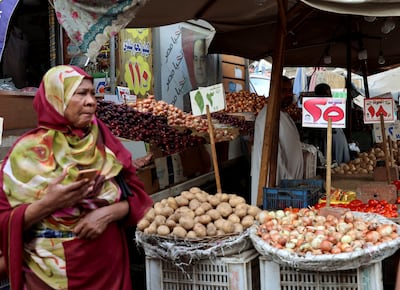Long queues of Egyptians on the hunt for sugar have become a common sight in Cairo neighbourhoods over the past week in the middle of a severe shortage in supply that has driven prices to record highs.
Sugar is the latest product to soar in price during Egypt's worst economic crisis in living memory, with an increasing number of the country's 105 million people unable to afford basic goods because of rampant inflation and stagnating wages.
Egypt's Supply Minister Ali El Moselhy addressed the sugar crisis in an interview on Wednesday and asked Egyptians to be patient.
“I cannot deny that citizens are not able to find sugar in a lot of stores,” Mr Moselhy said.
“All I ask is for you to be patient as we are planning to increase supplies this Saturday. And I urge you not to pay more than 27 pounds ($0.87) per kilo for sugar,” he told the pro-government ONTV network.
The minister’s interview with host Khaled Abour Bakr lasted nearly an hour and a half and included a portion during which he answered questions sent to the programme by citizens.
Many bemoaned the inability to find sugar in shops across Cairo, where the basic commodity has become a rare find.
“I have been to six supermarkets today and there is no sugar to be found. I finally found a place about five kilometres from my home that had a small stock. They were selling it for 60 Egyptian pounds,” said Manal Hossam, a housewife and resident of Cairo’s lower-income Alf Maskan district.
Mr Moselhy said the main reason for the shortage of sugar in shops was a severe drop in supply caused by decreased private sector supply, an increase in exports, and other logistical issues.
Egypt’s annual consumption of sugar is about 3.2 million tonnes, of which 2.8 million are produced locally, according to Mr Moselhy. Of the total, 700,000 tonnes are produced by the private sector, according to the minister.
But he emphasised during the interview that Egypt is not suffering an overall shortage of sugar, but instead lacks the logistics to supply its wares to citizens in light of a drop in the contribution from the private sector.
Sugar is still available at the Supply Ministry’s outlets where ration card holders (who make up about 60 per cent of Egypt’s population) can buy it for 13 Egyptian pounds ($0.42) a kilo.
Each ration card can hold up to four family members, and each one is given a monthly ration of 1kg of sugar.
Mr Moselhy rejected calls to increase the number of family members included on ration cards on the grounds that that would increase expenses for the country’s middle class.
“The government offers subsidised goods for over 64 million people, that’s around 60 per cent of the total population. If I increase the sugar allotted on every ration card, then what would the remaining 40 per cent consume?” he said.
He also blamed limited packaging capacity and “unclear supply chains” for the shortages.
Mr Moselhy promised that by December 15, the ministry will have pumped enough supplies to bring down prices, which he expects to stabilise at about 25 pounds a kilogram in early 2024.
The ministry has prioritised supplying the industrial sector, including sugar refineries and small food businesses, over shops, so they can continue production.
“There are a lot of small businesses who can’t afford to import, either because they can’t secure the necessary dollars to import raw materials and others because their operations are not big enough,” the minister said, “So it was more important for the country’s economy to supply them with raw materials first and then the consumer.”
A dollar crunch has crippled many Egyptian industries since it began in March 2022, many of whom rely on imported components to keep operating.
The increased demand for dollars, which has invigorated local currency black markets, has also made sugar producers prioritise exports over selling locally.
Although Egypt has devalued its currency three times since 2022, it is still widely considered overvalued and trades on the black market for 55 pounds per US dollar.

Producers get round ban on exports
Global sugar prices rose about three months ago, Mr Moselhy said.
This led many Egyptian private sector producers to export their wares to increase profits.
As a result, the country’s Ministry of Local Trade and Industry in March imposed a three-month ban on sugar exports.
The ban has been extended twice since then, in June and again in September.
However, the ban allowed for exports of sugar that “exceeded market needs”, according to a ministry statement in March, which meant that some producers were allowed to continue exporting at the ministry’s discretion.
“The ban only barred smaller sugar producers from exporting their wares and many then joined the government’s price initiative," a sugar wholesaler told The National.
However, large-scale exporters continued to export large amounts of sugar to make profits. "These are the country’s big commodity traders who have agreements of one nature or another with the government,” they said.

Price control initiatives
The government launched a price control initiative in October when it promised to bring down the prices of essential food items “by a noticeable amount”, according to a cabinet statement at the time.
The initiative was widely touted as a promotional campaign for the presidential campaign of incumbent Abdel Fattah El Sisi, who is widely expected to win the upcoming election. Ballot boxes will close on December 15.
Under the initiative, local sugar producers pledged to sell their wares for no more than 27 pounds per kiloram and a ministry watchdog was established to ensure they did not hike prices, Mr Moselhy said in October.
While the initiative worked at first, according to the wholesaler, producers started to pull out of their deal with the supply ministry because increased production costs meant they would be operating at a loss if they sold sugar at 27 pounds a kilogram.
Currently, sugar being sold under the initiative has not only dwindled, but is selling at 32 pounds per kilo, five pounds higher than the ministry-mandated price.
Sugar beets left to rot
Industrial action may have also affected sugar prices.
A farmer who sent in a question to the minister during his interview said that hundreds of tonnes of sugar beet had been left to rot in the south of the country.
Mr Moselhy said the ruined beets were a result of logistical and timing issues.
However, a number of local outlets reported in August that large-scale strikes at two of the country’s largest sugar factories, both in the impoverished Upper Egypt region, halted production.
The strikes were reportedly held over low wages and skyrocketing prices nationwide.


